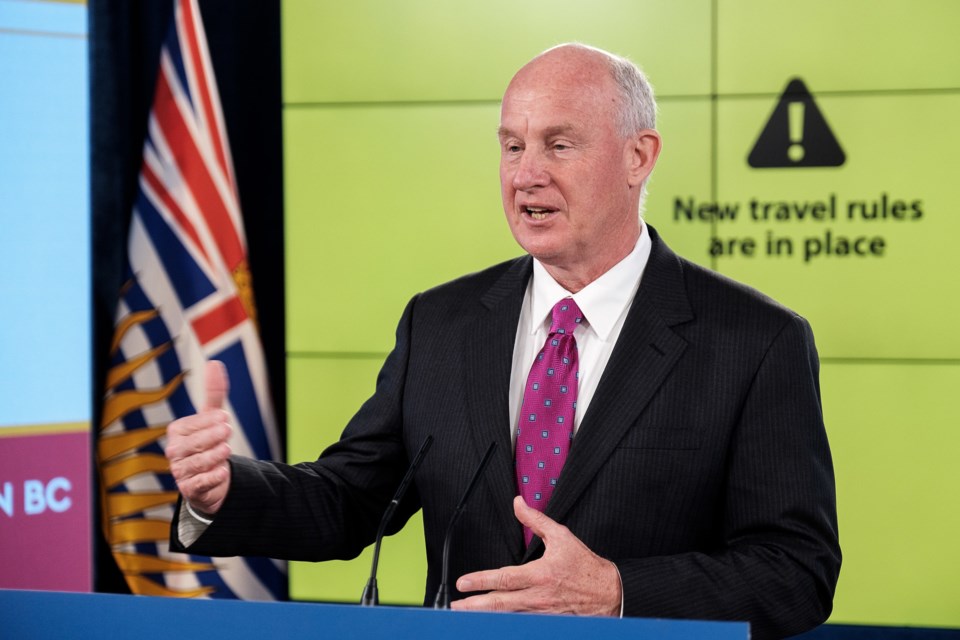Sunshine Coast ferry routes have not been included on a list issued by BC Ferries April 23 banning non-essential vehicle travel.
Public Safety Minister Mike Farnworth said at an April 23 media briefing formally announcing travel restrictions that BC Ferries will be restricting non-essential vehicle travel, will deter non-essential bookings and will limit sailings.
In a release following the announcement, BC Ferries clarified customers will be denied passage on ferries connecting regional zones if it’s deemed non-essential, and will rely on “other jurisdictional authorities for assistance with enforcement of this Order.”
The order applies to Tsawwassen and Horseshoe Bay routes to Vancouver Island, as well as the Comox-Powell River and Port Hardy-Prince Rupert routes, but doesn’t apply to routes within regional zones, including the Langdale-Horseshoe Bay and Earls Cove-Saltery Bay routes.
Instead, customers “will be reminded they should be avoiding non-essential travel at this time,” said the release.
A checkbox has been added for online booking “to ensure customers read and acknowledge they are travelling for essential reasons.”
“BC Ferries supports doing everything we can to discourage non-essential travel, and this Order gives us the legal authority we need to deny travel for non-essential reasons,” said BC Ferries president and CEO Mark Collins, in the release.
Extra sailings will not be added for the May long weekend.
Effective April 23, if anyone travels outside their “regional zone” for non-essential purposes they will be subject to a $575 fine – though Farnworth also made it clear that shouldn’t give people free rein to travel outside their local community.
The rule also applies to non-essential travellers from outside the province.
Under the new order, which will remain in effect until May 25, three “regional zones” have been established using health authority boundaries.
Fraser Health has been combined with Vancouver Coastal Health to form one regional zone, while Northern and Interior Health regions make up another zone, as does Vancouver Island.
As for the rationale behind splitting the province into three regional zones, Farnworth said it was a “common sense approach.”
“What we’re acknowledging is the complication of two significant health authorities in the Lower Mainland where people cross back and forth every single day to work, and the ability to police that, for example, or do checks – it’s just not practical.”
Travel within the order’s regional zones is not banned but is discouraged, said Farnworth. “If you live on the North Shore, that’s your local area. Stay in that area.”
The objective of the order, which was announced earlier this week and formally issued April 23, is to ensure people stop traversing large parts of the province in order to limit the spread of COVID-19 variants of concern that have led to record hospitalizations and put a growing strain on the health-care system.
At Friday’s media briefing, Farnworth said the province is working with tourism and accommodation sector leaders to support operators in cancelling bookings made by travellers outside their regional zones and to not accept new ones.
A joint statement from the Tourism Industry Association of BC and Ministry of Tourism, released April 23, asked B.C. residents to “stay local unless it is absolutely essential.”
The statement encouraged people instead to support local businesses by dining at restaurant patios with immediate households, visiting local attractions and “booking a staycation at a local hotel.”
Executive director for Sunshine Coast Tourism Paul Kamon said he is already fielding calls from accommodations operators and is seeking clarity from the province on how operators should approach booking requests from people living in Vancouver or other areas within the regional zone, and “to help us provide clear messaging to both our stakeholders and to potential visitors to the Coast.”
“The government is in a tough spot. [They’re] trying to be as clear as they can, but it’s not all the same in every region. There’s overlap, there’s vague notions of what is a local area – it depends on who you ask,” Kamon told Coast Reporter.
Another big question mark remaining is who will be liable for cancelled bookings. He noted customers are still required to pay administrative fees when cancelling through sites like Airbnb, for example.
BC Parks will be refunding bookings and informing the public about the restrictions, and highway signage will be added along the Alberta border.
As for enforcement, Farnworth said detailed information about that won’t be coming until next week.
He did, however, clarify that checks won’t be arbitrary or random, but will be similar to the police-run CounterAttack program targeting drunk drivers, and located at “strategic points at the borders between health authorities.”
Farnworth said the province has been working closely with the RCMP and chiefs of police on how the order will work, but did not respond when asked whether it would boil down to police pulling over RVs.
The delay was needed to ensure “it’s done right,” address public concerns, and ensure the order, which takes place under section 10 of the Emergency Program Act, “is the right one.”
“I want us to avoid the situation for example, that happened in Ontario,” he said.
As for definitions of essential travel, a detailed list has been supplied on the province’s website and includes school, work, commercial transportation of goods, returning to principal residences and obtaining health care.
“This is about discouraging travel, unnecessary travel,” said Farnworth. “It’s about reminding people that if we take this action now, if we don’t travel outside our health region … then you know what, come the summer we’ll be in a much better place where you hopefully will be able to travel like we used to.”



